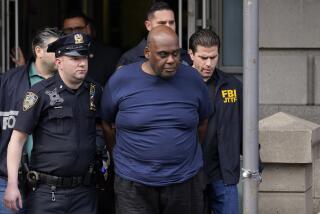Singer James Loses His Bid to Avoid Prison : Courts: Blocked from re-entering drug rehabilitation, he is ordered to begin a five-year term in assaults on two women.
- Share via
Singer Rick James, famous for his 1981 hit “Superfreak,” was ordered to begin serving five years and four months in state prison Monday after a Van Nuys Superior Court judge refused his last-ditch appeal to re-enter a drug rehabilitation program.
Instead, Judge Michael R. Hoff told the Grammy Award-winning singer that he was lucky he was not headed to prison for a dozen years, perhaps even for life, in connection with two violent attacks against women. The judge called the shorter sentence “a gift.”
For the record:
12:00 a.m. July 20, 1994 For the Record
Los Angeles Times Wednesday July 20, 1994 Home Edition Metro Part B Page 3 Column 4 Metro Desk 1 inches; 27 words Type of Material: Correction
Rick James trial: A story in Tuesday’s Times about singer Rick James’ trial incorrectly reported testimony by James’ girlfriend and co-defendant, Tanya Anne Hijazi. Hijazi did not testify.
Also, court records released for the first time reveal James’ tales of a troubled childhood and the depths of an addiction that consumed half his life and made him a virtual recluse.
James, 46, was convicted last year in connection with assaults on two women at his home and at the St. James Club & Hotel in West Hollywood, and could have faced nine to 12 years in prison on those counts, Deputy Dist. Atty. Andrew Flier said. The jury was hung on a torture charge that carries a life prison sentence.
But before prosecutors could retry James on that count, allegations surfaced that a district attorney’s investigator had furnished drugs to a jailed witness who testified against James. The investigator was not directly involved in the James case, Flier said.
Judge Hoff told James on Monday that “you can thank the D.A.’s investigator for your continued luck.”
Meanwhile, the alleged misconduct is being investigated by the state attorney general and the investigator no longer works for the district attorney’s office, a source close to the case said.
Because of the scandal and the internal probe, James was allowed to plead no contest to assault charges involving the attack at his home. Prosecutors said James and his girlfriend, model Tanya Anne Hijazi, imprisoned and tortured a woman during a weeklong cocaine binge at his gated house in the Hollywood Hills. Hijazi, who pleaded guilty to an assault charge and eventually testified against James, is serving two years in prison.
Under terms of the arrangement, James received a shorter sentence and prosecutors said they would not oppose his entry into the drug program instead of prison.
James originally entered the Civil Addict Program at the state Corrections Rehabilitation Center in Norco in February and by all accounts was doing well.
But Warden Jean E. Anderson decided in May that he did not qualify because his crimes involved acts of violence.
“The law is clear,” said Richard R. Clouse, an attorney for the state Department of Corrections. He said the department is given “a great deal of discretion as to whether any particular person is entitled to the Civil Addict Program. The fact that Mr. James is a famous person and a celebrity makes no difference.”
Defense attorney Mark Werksman said James was considering possible appeals. He contended that prison officials had been prejudiced against James because of his fame and “Superfreak” image.
“For 15 years, he has been known as the Superfreak,” Werksman said. “They rejected the Superfreak. They never bothered to learn about the real Rick James.”
James’ real name is James Johnson. He was born in Buffalo, N.Y.
Evaluations recently made public in James’ court file offer new glimpses into the singer’s background, and the depth of his drug addiction. They are based largely on psychologists’ interviews with James.
The reports described James as an abused child who first experimented with drugs at 14 and spent half his adult life as an addict. By 1991, he was holed up full time in his bedroom, taking as many as nine Halcion sleeping tablets a night and spending up to $1,000 a day on cocaine, according to the reports.
James, the third of eight children, described his father, James Johnson Sr., as an abusive alcoholic who left when he was 7.
“Rick observed that his father was ‘very sadistic’ with his mother and beat her often,” criminologist Sheila Balkan wrote in her Dec. 23 evaluation.
After his father left, James’ devoutly religious mother, Betty Gladden, worked two jobs--as a maid “and in the numbers rackets,” which James said made him ashamed, according to the reports. She also beat the children after her husband left, the reports said.
“For Rick, his mother was the main abuser. He relates that she was often uncontrollable, and that she administered beatings with a knotted electrical cord for little or no reason, ‘letting out her frustrations on us kids.’ ”
His relationship with his mother improved as he grew older, and she was supportive of his musical career. Later, he said, she became his “best friend.”
James said he started using drugs, including marijuana and heroin, in his mid-teens. His career in music exposed him to more drugs, which he consumed in increasingly large amounts after his first album in 1977 made him an overnight success.
“With my first check, I bought all the drugs I could afford,” he told Balkan. He started freebasing cocaine in 1981, the same year “Superfreak” started its climb up the charts.
By the late 1980s, he said, he was spiraling downward. He was involved in a lawsuit with Motown and did not write or record for four years. In fact, he said, he did not leave his bedroom.
When his suit with Motown was settled in 1990, James returned to the studio, but took the next two years to produce his next album. His mother was found to have cancer in 1990 and died the following year.
James was convicted of restraining and burning a young woman with a hot pipe during a weeklong cocaine binge in July, 1991, at his house.
He was free on bail when the second assault occurred in November, 1992, in James’ room on the 11th floor of the St. James Club.
The experts who evaluated James agreed that he probably would not have hurt the women except for the influence of cocaine, and that he would have benefited from the state’s drug program.
More to Read
The biggest entertainment stories
Get our big stories about Hollywood, film, television, music, arts, culture and more right in your inbox as soon as they publish.
You may occasionally receive promotional content from the Los Angeles Times.










